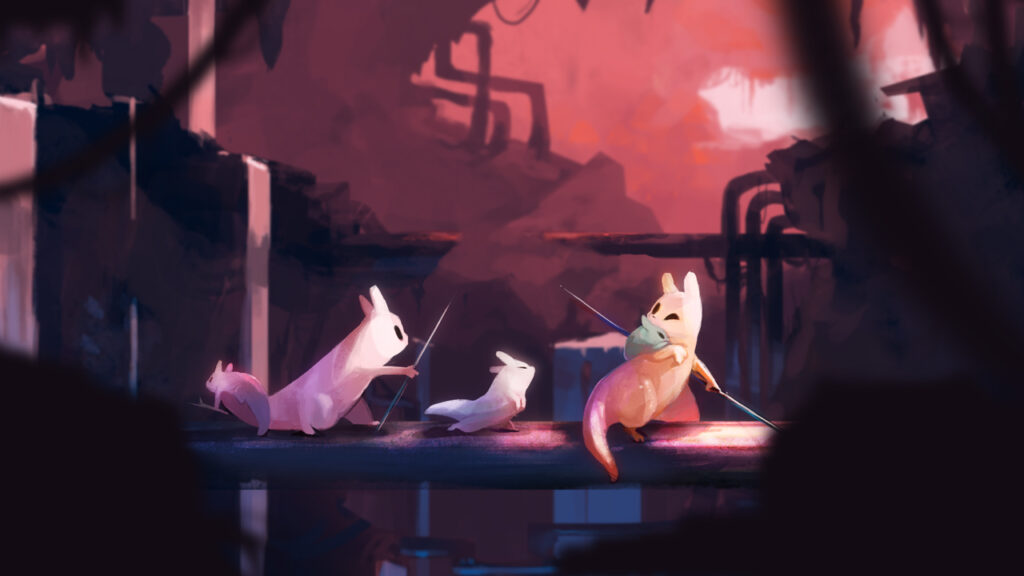
Image Source: Videocult
Rain World: On Difficulty and Exulting in a Disabled Body
When Rain World first entered my life in 2017, I couldn’t walk. Following a car accident where I injured my femur, pelvis, and three vertebrae, I needed surgery to allow my right leg to heal. It was weeks before I could put weight on my right leg, months before I could walk as I had done prior to my accident, and over a year before I could run again. All this is to say that I had a lot of time to pass while sitting down; naturally, I sunk many hours into video games that summer.
Specifically, I had a craving to play 2D platformers. Running and jumping had never particularly resonated with me as gameplay verbs, but now that they seemed so unattainable in my physical body, emulating them on a screen felt like a much needed reconnection. The game I settled on to scratch this platforming itch was Rain World. Initially, it was an arbitrary choice—I was drawn to the game’s artstyle and premise, but certainly hadn’t expected any sort of deep thematic resonance to shake me to my core.
But then, I became a slugcat.
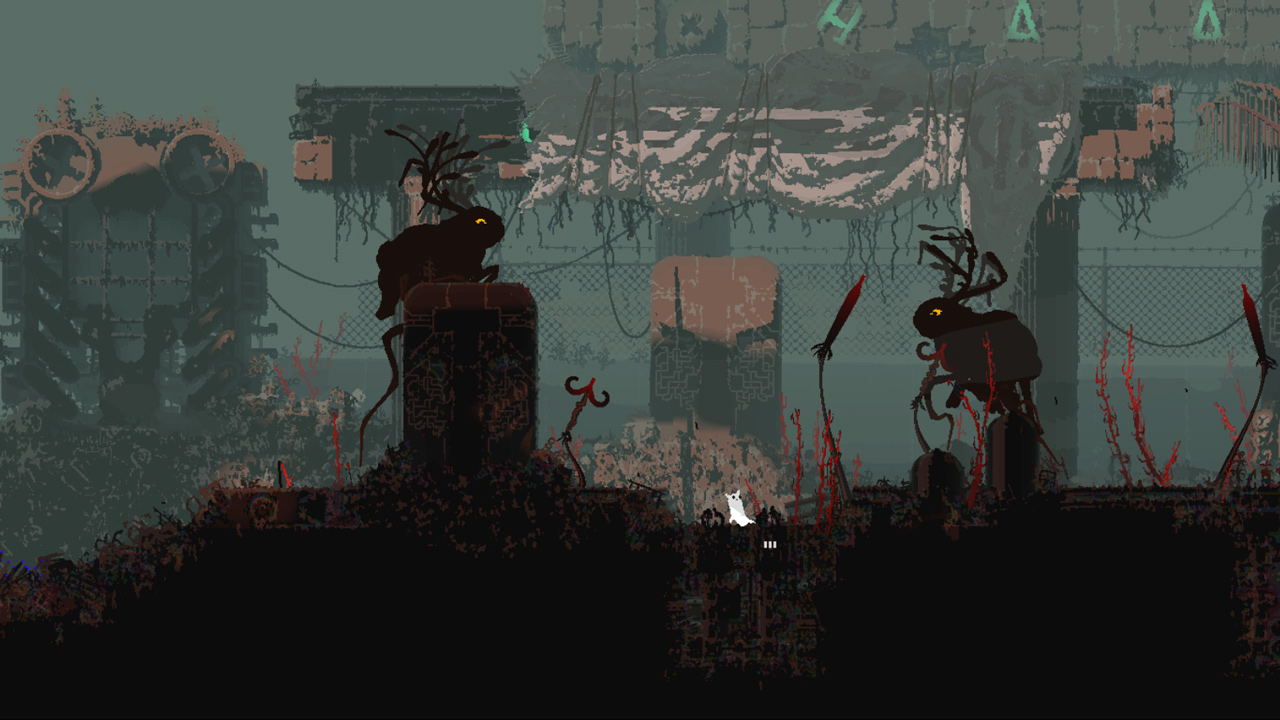
Rain World is a game in which you play as a slugcat — a small, nimble creature — separated from their family, trying to survive in a world filled with predators. Time is divided into “cycles,” during which the player must acquire enough food to hibernate before apocalyptic floods drown the world. The slugcat itself has limited mobility, almost no offensive prowess, and is killed, if not actively hunted, by the majority of the world’s other denizens.
As almost any critical or user review will tell you, Rain World is a difficult game. It isn’t and shouldn’t be controversial to say so. However, opinions diverge on the significance of this difficulty. Some, like this Gamespot review, contend that failure makes frustration “devolve into apathy.” Others might take a perspective like Hidetaka Miyazaki does in his interview with The New Yorker, and emphasize “joy that comes from overcoming hardship.” I’m not here to say that either of these perspectives, or anything in between, is wrong. However, the underlying logic with each of them is that difficulty is just a seasoning sprinkled on top of the game, and players will either appreciate the flavor or spit it out. In this view, difficulty is an adversarial force, something that might attract a certain kind of player, but only by pushing others away.
I’d like to offer a different perspective. While I definitely am a player that enjoys a challenge, I fully acknowledge that the challenge presented by Rain World is unfair, even cruel. However, it is precisely in its cruelty that Rain World made me feel seen while I was disabled by my car accident.
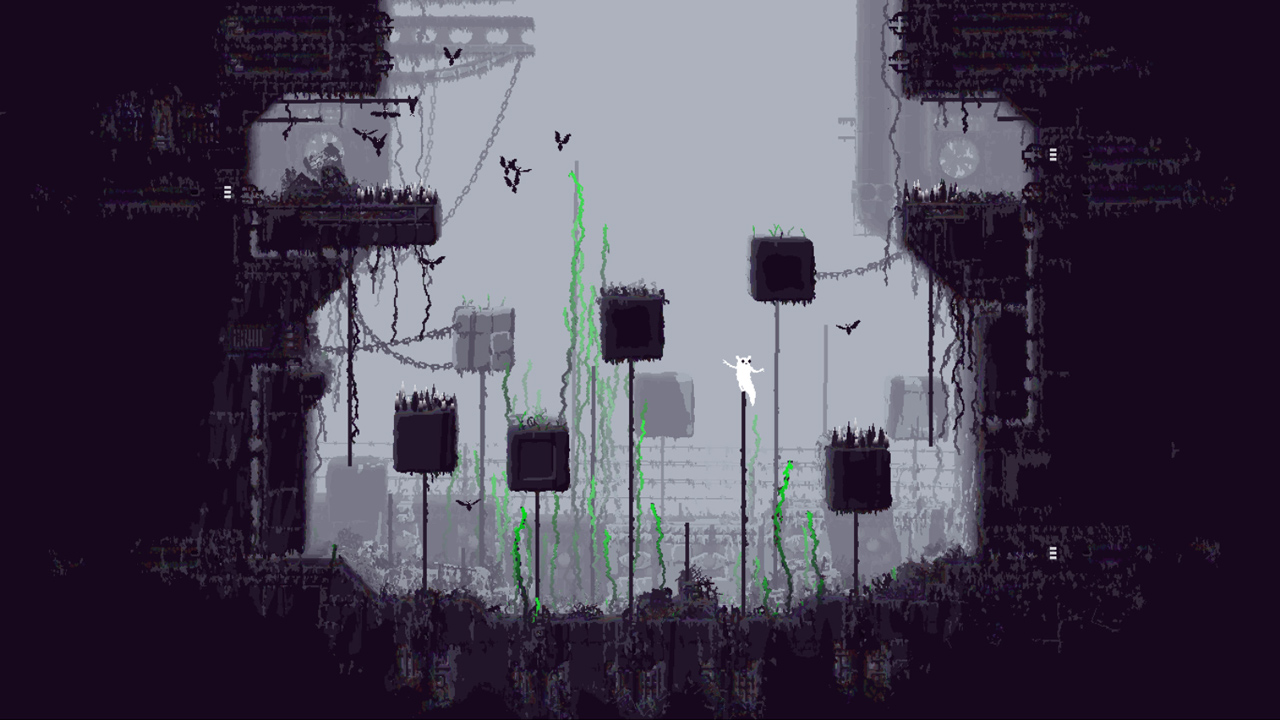
That’s because Rain World is, at its core, about the struggle to survive in a hostile world. More than just being “difficult,” Rain World paints a particular vision of what it means to survive. In Rain World, survival literally happens in cycles, both the repetitive drudgery of eating and sleeping, and in game over followed by continue. It happens in failure after failure after success, in honesty with your own limitations. Survival takes priority over progress. Survival happens in a world that is much bigger and more complex than yourself.
This perspective on survival was one that resonated with me following my car accident. After confronting my own mortality and receiving an injury that kept me from moving in the world as I did before, even the mundane became arduous. Despite surgery and physical therapy, a return to my old condition seemed doubtful, sometimes impossible. In addition to the physical toll my body had taken, my mental health grappled with the incontrovertible notion that an even worse accident could happen again at any time. In short, in my world, it didn’t make sense for survival to be anything other than a struggle.
And yet, in Rain World, there are moments of joy. This shouldn’t be too surprising; it is a game, after all. But what did surprise me was that the joys of Rain World exist not in spite of, but alongside the struggles of the game. Most especially, I felt that through the control of the slugcat avatar, Rain World called for a new kind of embodiment that changed not only my relationship with the digital creature, but with my disabled body.
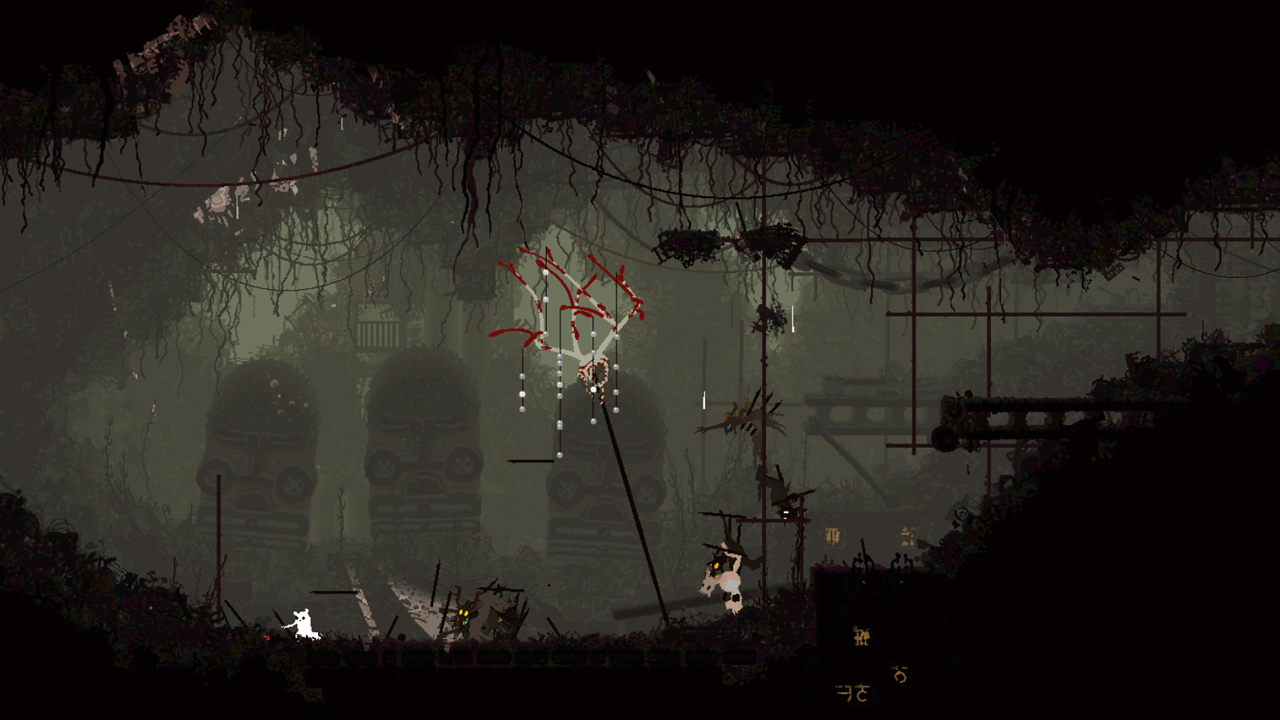
The slugcat’s body is, at first glance, a meager, limited apparatus. It cannot jump very high. While standing, it can run moderately quickly, but is still at risk of being overtaken by many predators. The spears it throws to attack rarely kill enemies. It can crawl into small tunnels and climb poles, but generally does so slowly. Juxtaposed with Rain World’s ferocious predators and the hazardous terrain, the slugcat’s body is frail, awkward, and at odds with the world around it.
In short, exactly how I felt following my car accident.
The vulnerability I felt was only exacerbated by the immense pressure that I was putting on myself to make a full recovery. I knew that doing so would require me to not only navigate the world with my newly disabled body, but also to keep pushing myself to regain the strength my body had lost. I lived with the fear that if I failed to follow through on my physical therapy, or further injured myself, or if I just had bad luck, then I would never recover the mobility that I had prior to my injuries. Although the stakes weren’t quite as high as immediate survival, in this push for mastery over my own body I identified with the vigorous physical demands of the slugcat’s 2D platforming life.
The slugcat doesn’t technically grow stronger over the course of a game of Rain World, but achieving mastery over its controls is a core part of the game. Details like how far the slugcat jumps or at what height it throws objects are some of the first essential information that the player must learn. There are also advanced movement techniques that can be employed, such as backflipping and sliding, but these require precise inputs and are not taught directly to the player. Following the Rain World Remix update that was released alongside the recent Downpour DLC, these techniques have a chance to be displayed as loading screen tips, but otherwise can only be discovered by experimentation.
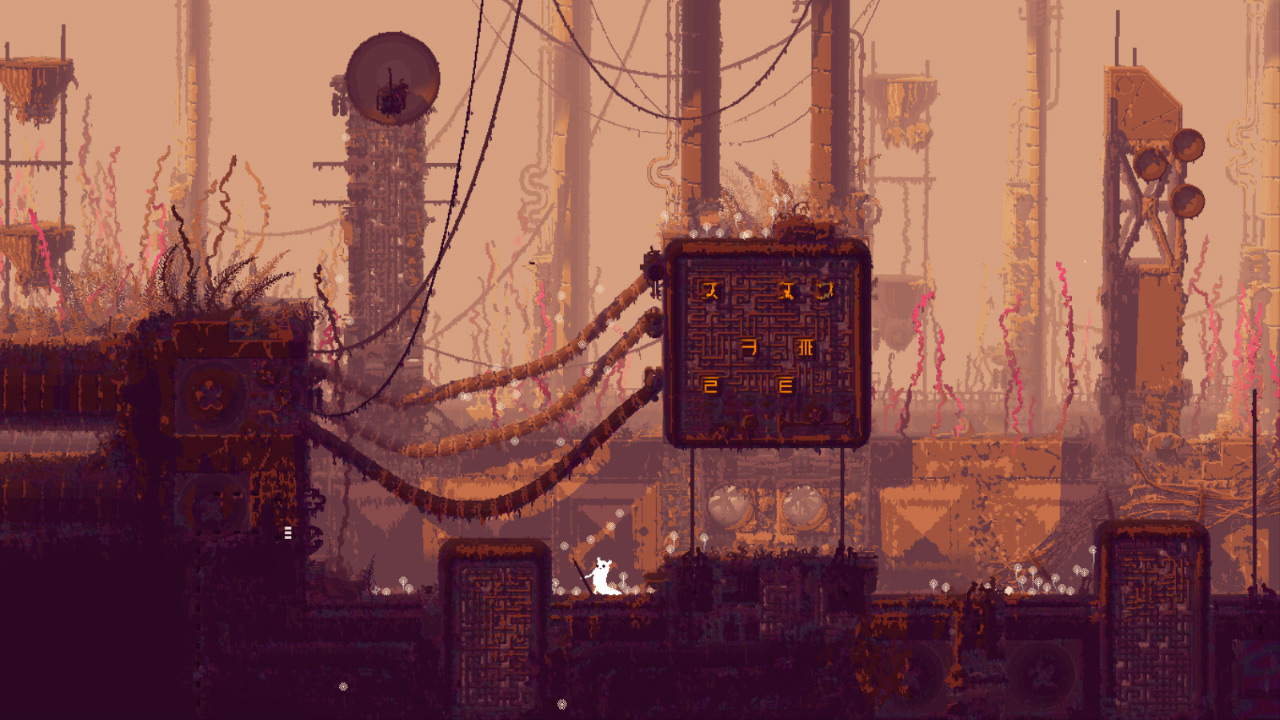
But it is precisely this endeavor to learn the capacities and limitations of the slugcat’s body through trial and error which helped me to forge a new relationship with my human body. Rain World’s hands-off approach to teaching mechanics is what incentivizes the player to cultivate attunement to the slugcat avatar. To get the most mileage out of the slugcat’s abilities, players need to closely watch the slugcat’s body: the slugcat’s stance, animations, and even facial expression all convey important information about how it will respond to player inputs at any given moment. Players are best served by building an intuitive sense of the game’s physics and a reactive approach to inputting commands. Achieving this attunement is hard, but the reward is incomparable; the thrill of narrowly escaping multiple predators thanks to a daring series of evasive maneuvers is one of the absolute peaks of the Rain World experience.
Reaching that level of proficiency takes time, but Rain World’s approach to progression makes that time for you. One of the many axes of difficulty in Rain World is its “karma” mechanic, which prevents players from moving past a region until they have survived a certain number of cycles in a row. This can be frustrating because it penalizes the already inconvenient and demoralizing process of in-game death. However, there is also a kind of liberation in this system; once you’ve hit the lowest karma possible, there’s nothing more to lose by dying. To me, it felt like the game was telling me that it was okay to fail, that I was not expected to be able to cope with all of the challenges facing me yet. In the many cycles that I found myself with minimum karma, I was free to play adventurously, to explore both the world and the controls of the slugcat. As I did so, I began to worry less about the vague idea of progress and more about just existing in Rain World as it was, indulging in the joy of discovery.
I’m not sure when, but at some point while I was playing, it clicked for me; the patience that I extended to myself when playing Rain World was the same patience I owed my own body. Any “progress” I made toward recovery would be non-linear and ultimately beyond my control. The best I could hope for was to attune to my body in its disabled state, and learn to use it well. Once I understood this, it was so much easier to be joyful in my body.
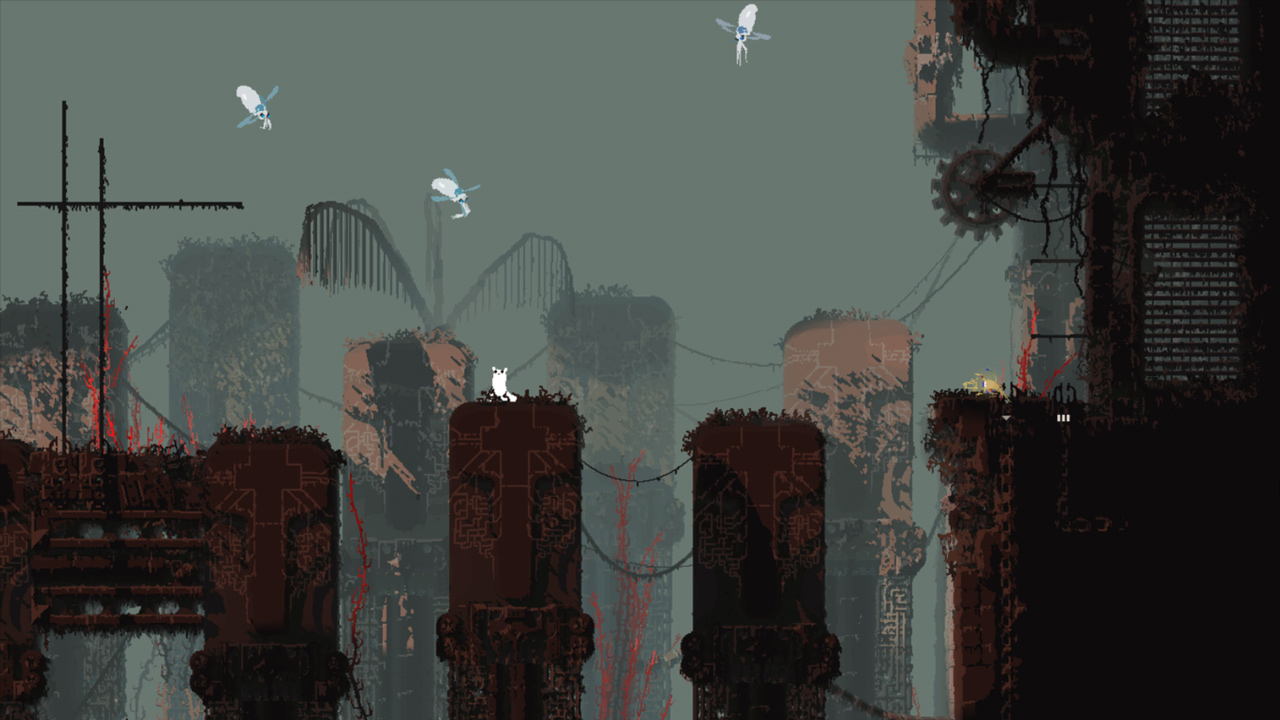
There’s a specific moment of my first playthrough of Rain World that I remember vividly – The rain had arrived. I was in a region with a high degree of verticality, and I had to go upward to reach the only shelter I knew of. As I tried to make my way back, my path was blocked by multiple lizards – I had no choice but to flee. However, with the rain beating down on the slugcat, its agility was greatly reduced, and I plummeted downward, expecting to die. I barely managed to survive by hanging onto a pole, and knowing I couldn’t possibly climb back up, I kept going downward, half jumping and half falling. By sheer accident, I traversed enough screens to find another shelter before the rain finished off the slugcat.
This was not a moment of triumph; I entered that shelter beaten down, off course, and lost. The only rewards for the whole ordeal were survival and more uncertainty. Nevertheless, I felt a surge of pride in the slugcat. This clunky, vulnerable creature had barely survived — yet it had. Its body, though not naturally adept at high-pressure platforming, had gotten the job done. It dawned on me that this whole time, my human body had been doing the same. My legs, whether they were running or limping, still carried me. My arms, whether I was standing or sitting, still reached for me. And my body, whether it recovered or not, was still mine. This body had taken me through a car crash, and it will keep getting the job done through countless more terrors and joys.
If you like what we do here at Uppercut, consider supporting us on Patreon. Supporters at the $5+ tiers get access to written content early.






1 thought on “Rain World: On Difficulty and Exulting in a Disabled Body”